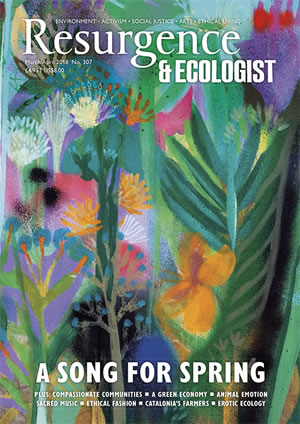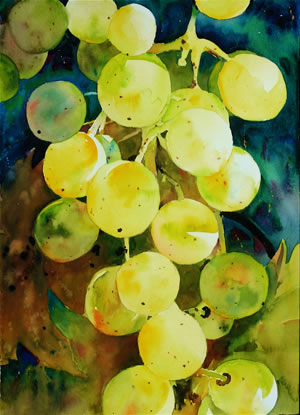My great-uncle worked for the Catalan Republic in the 1930s,” says Enric, now a grandfather himself. “Under Franco’s regime, anyone who was working for Catalan or for cultural things was jailed. Because of the poor conditions, he died in prison.”
Sitting in the cellars at Vega de Ribes, holding a glass fresh with young wine from this year’s harvest, I watch as Enric’s eyes glisten. There is sadness in his voice. He is telling me this story not to sensationalise his family’s suffering, but to illustrate how for Catalans the political is personal.
Several hundred years before the Romans, the Phoenicians brought viticulture, along with an early alphabet, from the Mediterranean shores of the Middle East to Catalonia. It is this long history of winemaking that modern Catalonian farmers like Enric are referencing as they develop their unique, artisan vintages using traditional grape varieties.
The struggle for recognition of Catalan culture has come to the fore as the recent move for independence splits opinion both inside Catalonia and Spain and around the world. Just one generation ago, Enric’s mother was forbidden by law to speak Catalan outside the home. Not allowed to study or write the language of her mother tongue. But the Catalan language and culture have undergone a revival. Today, Catalan is spoken by at least 40% of the population, across generations and in schools, government departments and the media. In addition, Catalonia is a prosperous region, contributing 20% of the total Spanish economy.
In a world facing an uncertain future, what would independence mean for Catalan winemakers? Executives of Freixenet and Cordoníu – two of the largest vintners in the region – have said that breaking away from Spain would be “a burden, not a blessing”, and point to issues regarding distribution and taxation of their products. But what of the smaller producers? How does the independent farmer make sense of it all?
Enric’s farm, La Serra, has been in his family since the Middle Ages. They produce 18,000 bottles a year on average, and since he relies on overseas trade and tourism, he is quick to acknowledge that the strikes that have been taking place across Catalonia, the political disturbance and, in particular, how it is viewed overseas, harm the Catalan economy.
“I have potential clients who have chosen not to visit recently,” he explains. “And of course tourists, who contribute hugely to the economy of Catalonia, will simply go elsewhere.” Financial concerns have been cited as one of the strongest reasons for Catalonia wanting independence, and Enric assures me that there is truth in the stories about how taxes sent to Madrid from Catalonia are not returning to create and maintain infrastructure.
“This affects our roads, public transport, our hospitals and schools,” he says. “We simply cannot go on like this.” It’s easy for me, being Welsh, to understand how a centralised government can overlook, disregard or simply misunderstand the needs and concerns of a nation far removed in distance and self-identity. Devolution puts power into the hands of those who live close to the land and people being governed. The question of the moment – not just in Catalonia, but also in places like Scotland, Venice and Flanders – seems to be just how far this is allowed to go.
In addition to politics, there are other questions hovering, and when Enric uses the word ‘resilience’ I know that we have crossed from the general to the specific. He is a farmer who has lived on the same piece of land all his life. It is the kind of connection between land and people rarely seen in the modern Western world, and it gives Enric a personal resilience. Thirty years ago, he was ahead of the game when he chose to switch to organic methods, turning all his crops over to chemical-free production. Now he is making adjustments in response to climate change.
According to a survey by the Research Institute of Organic Agriculture, a third of Europe’s organic grapes are grown in Spain. In the 1970s, around the same time as Vega de Ribes, Albet i Noya, in the Penedès town of Sant Pau d’Ordal, introduced organic methods. Today, they produce over a million bottles annually from 80 hectares of vineyards. Organic techniques include substituting weedkiller with mechanical removal, and emphasising healthy soil over chemical fertilisers. Cover crops between vine rows and edge planting of shrubs and hedges help to decrease soil erosion and improve biodiversity, providing a natural habitat for beneficial insects.
In addition, organic winemakers have a commitment to fermenting with indigenous yeasts, clarifying with natural products, and reducing the use of sulphur dioxide, a substance that helps preserve wine but can also cause a hangover. Anna Toledano, who helps organise Albet i Noya’s many wine tourism activities, told me their philosophy encompasses respect for the environment and a more natural approach to life and health.
It’s a similar story at Can Suriol, where I meet Assís, the farm’s 35-year-old designated oenologist. He is in the midst of harvesting full, purple Ull de Llebre grapes with a small team in his family’s vineyards. As the full buckets are emptied into the waiting lorry, Assís tells me he feels lucky that he, unlike many of his peers, did not “miss a generation”. His parents bucked the trend of delivering all their grapes to big vineyards for mass processing, instead investing heavily in the farm. They focused on small-scale wine production and tourism and will soon open the old farmhouse as a casa rural.
Their new cellar is equipped for the future with aluminium vats, but they still choose to ferment some wines in underground concrete cellars and chestnut barrels. In addition to traditional techniques, Assís stresses the importance of using grapes native to the region. Deeply connected to the land, he feels it essential to live on the property, “with the grapes”. Passionate about the art and craft he has both inherited and chosen, Assís explains that “growing great grapes makes great wine, free from the need to add anything else.”
For Vega de Ribes, Enric favours the sweet crispness of Malvasia de Sitges, a variety saved from extinction by local resident Manuel Llopis i de Casdes. This local hero planted his vineyards along the seafront and later bequeathed his land to a local hospital charity on condition that they continue to cultivate the vines. Tenderly cupping a bunch of these pale, almost translucent grapes on the vine, Enric explains that Malvasia are particularly appropriate for the weather patterns delivered by climate change. Unusually intense heat in spring is leading to earlier harvests, which is problematic for the pickers who, instead of waiting until the relative cool of September, have to harvest during the intense heat of summer. However, Malvasia need extra time to ripen and can be left until autumn before needing to be processed.
As they take me through the wine-pressing rituals, transforming truckloads of newly picked grapes into sweet, slightly fizzy juice, both these farmers speak about climate change in a matter-of-fact way. For them, it is a reality. Their lifestyle is so much in tune with the seasons. Their business is dependent on their skill to track, anticipate and respond to precipitation and sunshine – so much so, that La Serra has its own weather station. Both vineyards are putting systems in place to adjust to changing weather and climate patterns, including drought, to which Catalonia is particularly susceptible. This awareness extends to using organic corks, sustainably harvested from local plantations.
Wine is an important feature in Catalonian culture, and these farmers are taking the Catalan passion for independence into their winemaking, mirroring the determined effort to revive the Catalan language and the struggle for political self-determination. The government in Madrid may not like the way that Catalonia expresses itself, but it might note how, in the space of just one generation, the outlawed language has been given a new lease of life. Likewise the enthusiastic participation in Catalan cultural events, as each small town and village brings together the whole community with traditional costumes and joyful parades, rich with music and song.
Perhaps the most surprising aspect is that the younger generation are as engaged as their elders, as they are in these farming families, where they work and study viniculture, oenology and the marketing and promotion of wine in the global arena. Enric’s son Biel recently spent time in California exchanging ideas and inspiration, and Assís, too, has travelled to learn new techniques. In addition to enjoying centuries of handed-down knowledge, they are open to fresh ideas, showing how Catalonia is a culture both rooted in the past and alert to the future.
To help explain this characteristic, Enric points to the geographical location of Catalonia. Its vast hinterland of mountains and rivers is bordered with France on one side and mainland Spain on the other. Open to the sea, too, it has traditionally been a nation tolerant of other cultures and has a welcoming stance towards immigrants, including refugees.
I’m no wine expert, but I’m comforted that these winemakers care so deeply about the lands they are farming, as well as about the products they are selling. As a foreigner living in Catalonia, I have received nothing but goodwill and grace, despite my faltering attempts with the languages. However the politics turns out, we can be sure that the Catalan people will continue to express their unique take on the world. Perhaps, like all of us, that’s all they really want.







